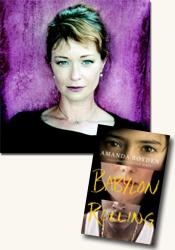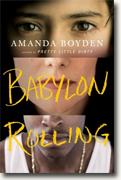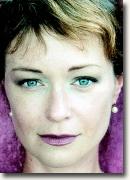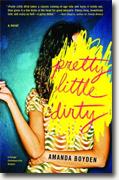author interview
book reviews:
· general fiction
· chick lit/romance
· sci-fi/fantasy
· graphic novels
· nonfiction
· audio books
· author interviews
· children's books @
curledupkids.com
· DVD reviews @
curledupdvd.com
newsletter
win books
buy online
links
home
for authors
& publishiss
for reviewers
The maga Portunista and her colorful subcommanders lead a ragged, outnumbered brigade in the wake of an international war, against her increasingly ruthless adversaries. But the ambitious commander finds herself irreconcilably drawn to a charismatic, kind and hopeful stranger. Click his e for more on Cry of Justice or read our review.
|
|||||
 
Luan Gaines interviewed author Amanda Boyden about her novel Babylon Rolling Interviewer Luan Gaines: What was your inspiration for Babylon Rolling Amanda Boyden: In some ways, Hurricane Katrina is responsible for this novel. Babylon Rolling Orchid Street is filled with diverse characters, essential to a tale of community and personal challenges. Are the families on this street representative of the city of New Orleans? We have homogenized suburbs, same as other large American cities. Or maybe I should say “monochromatic” neighborhoods. Most of these, though, predictably, exist in the outlying areas between malls and chain restaurants. The core of New Orleans, the older section of the city, is quite diverse, as it has been for a very long time. I’ve never lived on a block that didn’t encapsulate economic and racial diversity. That’s not to say I couldn’t go looking for the opposite and find it; a person only needed to walk into one of the housing projects in the summer of 2005 to see how race and poverty were (and still are) so painfully, obviously linked. Still, the fictional Uptown Orchid Street is, in my experience, very representative of large areas of the city. Can you explain the relevance of the title, Babylon Rolling Initially, the novel was entitled L’Enfant Terrible, but seeing as how my Minnesotan cousin couldn’t pronounce it and told me he wouldn’t be able to ask for it in a bookstore, my editors and I decided a new title would be a good idea. I liked, though, how the French expression embraced a number of aspects of both my characters and maybe the city itself. I went searching for something that worked in a similar way. In the novel and in reality, Babylon is the name of one of our Mardi Gras parades. In early 2005, Babylon was followed by Chaos. And when a parade starts moving, we say that it’s “rolling.” So, on the surface, Babylon Rolling
At least where my writing is concerned, I don’t think people would describe me as shy. When it came down to my representation of Fearius, I knew I wanted to be brave. I wanted to be unflinching with him, and maybe in doing so, reveal that all people have both good and bad instincts, behave in ways that are sometimes right and sometimes wrong. I wanted to write a character whose world view seems simple at first, his approach to other characters seemingly one-dimensional, but who ends up being, underneath, a very complex and sometimes empathetic person. I wanted to take Fearius’ position within his microcosm and have it influence the outcome of other characters in an unpredictable, surprising way. This mixture of families, black, white and East Indian, is essential to the appeal of this very American city. How does each of these characters contribute to the substance of your narrative: Ed, Fearius, Cerise Brown and Philomenia? Ed’s an obvious outsider in all sorts of ways, having been recently transplanted, and so he’s one of the novel’s “in roads” for a reader not living in New Orleans. He helps to explain or demonstrate some of our more peculiar customs here. Of course he’s much more than that, I hope: he falls far from his Buddhist state of grace, to be sure, a good character inadvertently choosing a wrong path.
The freak accident that involves Roy, Cerise, Muzzle and an outdoor barbeque is the beginning of a cycle that ultimately ends in a dramatic climax. What does the neighborhood’s response to the accident tell us about the people who inhabit Orchid Street? I honestly hope that their response is representative of what might happen in real life here in New Orleans. We’re a social, chatty bunch, for the most part. And we tend to rally. My husband and I witnessed a murder some years ago, and I was amazed—awed, actually—by the kind response of the neighbors to me. Did you know it’s considered bad taste to pass a stranger walking on the street here and not offer a greeting? To not acknowledge your neighbors would likely be some kind of sin, so of course the Orchid Street folks had to gather and talk it out. In this exceptionally colorful place, Indira Gupta stands out in her brilliant saris, she and Ganesh fitting easily into their new environment. What is the Gupta’s significance on Orchid Street? I suppose I’d say they are the “Other” that we’re all moving towards knowing in some capacity. Globalization is a reality, even for historic, strange, proud New Orleans. Change, be it on a single street, or in the speed of our internet access, is coming. (I was tempted to add “hell or high water,” my stab at a cheap joke…) The threat of Hurricane Ivan is a foreshadowing of Katrina, in this case passing over a city gridlocked by massive evacuation. How does the neighborhood reaction to Ivan stimulate alliances, especially Ed, the kids and the Gupta’s? Ariel and Sharon? Ivan affords Ariel the opportunity to do what she does with her husband gone while aligning her, in some ways, with Sharon. I knew where I was taking Ariel and knew that she’d eventually need a friend. As well, I wanted to throw some really difficult, racially tense times at Ed, the man who at first refuses to acknowledge that any racial tension actually exists. My husband and I evacuated for Hurricane Ivan, and it was one of the most horrific, exhausting crawls I’ve ever undergone. I figured if I ratcheted up the situation with some additional fictional tension where race was concerned, I had a pretty good recipe for shaking up “good Ed.” And, of course, Miles has to see Dad as a dork for Miles’ own character trajectory to come full circle. Ed and Ariel’s marriage is out of balance when the Minneapolis couple moves to Orchid Street. Why is Buddhist Ed suddenly so unattractive to his restless wife? What is she seeking that she doesn’t find in the marriage? I hope her lack of attraction doesn’t seem sudden but rather long-brewing. Ariel wants something different. Something less normal. Danger. Instability. A second martini when she knows she should stick with beer. What I suppose most people who step outside of their marriages desire.
Ed’s religious convictions fail him a number of times, a notion that’s long fascinated me, the granddaughter of a Lutheran minister. Ed certainly knows that he’s to be accepting or at least non-judgmental of all of god’s creatures, but many religious beliefs are harder in actual practice. Still, it’s a primary tenet of most of the good ones to keep on tryin’, especially if you get it wrong the first time. Or the second time. Or the third. Ed’s got some work to do, and where better to start than with the object of his wife’s betrayal? Oh, those kids! (I confess I was longing for an old school spanking!) Ed struggles with the discipline of his children, Miles and Ella. Why does this aspect of parenting cause him such anguish? What does his ambivalence say about Ed’s ability to live comfortably in his own skin? You know, my sister recently had her youngest son pull down a huge bookshelf in his older brother’s bedroom. He was unhurt, but my sister said that another mother in another time would have taken out the strap. Naughty boy! (My sister only believes in time-outs, for the record.) Kids can really be a struggle. And when you’re a non-confrontational, relatively passive father all but single-handedly raising two kids, the daily battle would be trying, to say the least. I suppose I wanted Ed to get it from all sides, have the daily trial of the kids to exacerbate his other difficulties. Philomenia is easily one of the most complex personalities on the block, longing to escape the death watch of her cancer-riddled husband, constantly editing her public persona, concealing her true feelings. How does Ed’s behavior contribute to Philomenia’s mental anguish? Could he have done anything to avoid her fixation with him as a troublemaker? Sadly, I think Philly Cheesesteak has it out for him at the very beginning and that Ed has very little opportunity to turn her obsession away from him. He’s just unlucky in that regard, and Prancie is, ah, ill. The Tokyo Rose serves multiple purposes, a meeting place for locals, a haven for Ed to escape his troubles, a popular Mardi Gras hangout. How important is this neighborhood bar in defining issues that confront various characters? A number of characters needed a place to go to when they wanted to escape their homes. I didn’t want them to go far away. I’m certain local readers will recognize my fictional rendering of a real place…
Fearius lives in a parallel universe with a strict code of honor, Alphonse more powerful than his own father. What do Alphonse and the street offer that Fearius cannot find elsewhere? At this point in his life, is he aware of alternatives? To be completely honest, I’m not sure that the real-life counterparts of Fearius have much in the way of alternatives. It’s horrible, I would think, to be trapped. I’ve had my share of hard knocks, but to try to scrabble out of such a deep hole at such a young age strikes me as next to impossible. I wish the schools, maybe the neighborhoods-at-large, worked harder to help our real Feariuses see any other options as viable. Everybody wants to belong. Everybody wants a protective big brother, by blood or otherwise.
If I tell you that I hear voices in my head, would you still print this? Seriously, I think authentic character voices are key, and as I mentioned earlier, I’ve tried to be brave where character representation is concerned. I found these characters fascinating, a subtle blend of diverse lifestyles and human failings in a dynamic city where life is often lived in the extremes, passion, celebration, tragedy, humor. Have your protagonists told the story as you envisioned it? What would you like your readers to take away from Babylon Rolling I hope my protagonists have told an interesting story that remains true to our city. I think if I manage to change just one reader’s mind about culture-clash or race—or even to simply look at a stranger with a modicum of kindness rather than immediate judgment—I’ve done something right. I don’t have any answers, but to open a dialogue once more seems like the first place to start. Although Babylon Rolling Oh, they have to prevail, don’t you think? I’m so hoping to revisit some of these people down the road… Do you have any advice for aspiring writers? Learn your craft, and write your heart out. Remember, always, that you have to connect to a reader on an emotional level, or you’ve done nothing but write for yourself. Amanda Boyden was born in Minnesota and raised in Chicago and St. Louis. Formerly a circus trapeze artist and contortionist, she earned her MFA from the University of New Orleans, where she now teaches writing. Her first novel, Pretty Little Dirty, was published in 2006. Luan Gaines is a contributing editor of curledup.com. Her interview with Amanda Boyden was written in conjunction with her review of Babylon Rolling. © Luan Gaines/2008.
|
|||||
| fiction · sf/f · comic books · nonfiction · audio newsletter · free book contest · buy books online review index · links · · authors & publishiss reviewers |
|
| site by ELBO Computing Resources, Inc. | |



